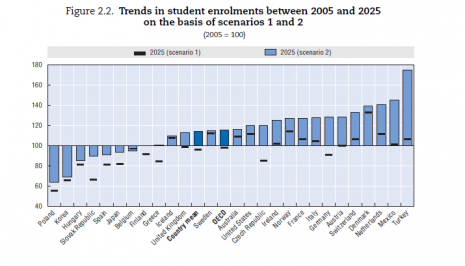Forecasting 21st century: two examples
Before I go on to answer the questions of who will be the next world superpower, let me suggest that you take a look at the most recent issue of OECD leading indicators. Media have recently been very bullish on the speed of recovery, reading financial newspapers you could almost smell it, almost feel recovery at your fingertips. Take as big breath and then look again at the OECD data, showing that global economy will be badly deteriorating in the next six months or so. So much for the hopes of recovery, fasten your seat belts and brace for a roller coaster ride.
Now back to the topic.
I read two books this weekend: one is George Friedman’s “The next 100 years”. Mr Friedman is a founder of Stratfor, a forecasting think tank. It is probably linked to the CIA and it focuses on geopolitics and military aspects. After reading the book, which was an excellent read and helped me understand how the world looks when one puts on US glasses, I found that Stratfor analysis is not very well founded in economics and finance. They do provide a great coverage of the implications of demographic trends (although fail to notice the recent positive changes in France and Scandinavian countries) and explain why sharia law in the world of Islam will not survive when Arab women start having fewer children, but if or when it happens is still an open question. This book predicts that US will remain the global superpower in the 21st century, and other countries will rise or fall only when US wishes so. I bet British had the same vision in late 19th century. Interesting part of the book is a forecast that new global powers will be (after Russia and China disintegrate) Japan, Turkey, Poland and Mexico. We talking 2050 here, but with today’s level of intellectual capital in the last three countries it is hard to imagine they become global powers.
Another book I read this weekend was Jacques Attali “A brave history of the future”. Mr Attali is French economist and cofounder and first president of the European Bank of Reconstruction and Development. He tells a story of traveling “cores” which for some time – usually 50-150 years, become the center of the world, powerful, rich, innovative. He presents 9 episodes when cores were created, the last one in California. Then book presents a story showing USA loosing its dominance (after 2030) and world becoming a giant, borderless market ruled by hypernomads and insurance companies, with rapidly diminishing role of the state. Henry Kissinger called this book brilliant and provocative.
So you have two just released books with forecasts for 21st century. American CIA-related strategist predicts USA will rule the world, and French economist expects planetary war and planetary democracy to shape the new world, put end to USA dominance and create a global world powered by IT, widespread surveillance a run by hypernomads. But both books have common themes. Widespread and advanced technology is one, in one case USA will master it and use to its strategic advantage, in other book private companies use technology to take power from the state.
Friedman book is fun to read, clear, well explained, almost impossible to dismiss based on presented logic. Unfortunately the logic is partly false. It is based on the assumption, that past powers will become future powers (Turkey, Poland, Mexico were equal of even more powerful than todays global or regional powers in the past). The second logical mistake is that technological progress originates around military spending, and by definition USA spending dwarfs all others (indeed USA defense budget is 50% of global defense spending) so technological progress can be made only in USA (internet, space technology). But these days it is perfectly possible, that some maniac scientist will come up with a new energy formula in anyplace in the world, and the power of commercialization of innovation is highest in USA – true, but other countries can deliver as well. The third possible mistake is assumption that wars fought between countries will determine the future global order (because the always had). As you can see in the Attali book, there is another possibility perfectly plausible, when the masters of finance and innovation set the stage for the 21st century, and private armies become more powerful that state ones. So do not get to excited about Poland and Turkey becoming global powers and waging a war. Polish king Jan Sobieski the 3rd has fought the war against Turks and won the famous Viena battle, saving Europe from Turkich flood. This is unlikely to be repeated.
Late addendum. Please find below why Poland has far lower odds than Turkey or Mexico to become the world power, unless we one day get a smart government and right policies are adopted. Chart below taken from OECD publication on education in 2030 shows that Poland will face dramatic fall in the number of students in 2025, irrespectively of the analyzed scenario. Turkey and Mexico will be on the opposite side of the scale, please note that today all three countries have similar number of students (2.1-2.3 mln). China has some 35 mln students, just a small reminder.
